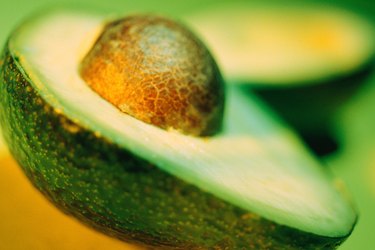 Even if the surface has browned, the flesh underneath could be green. Image Credit: Stockbyte/Stockbyte/Getty Images
Even if the surface has browned, the flesh underneath could be green. Image Credit: Stockbyte/Stockbyte/Getty Images
Avocados don't last long once they've been cut open, and even an avocado with ripe, vibrant green flesh can turn brown and unpleasant-tasting in just a few hours. If your avocado is brown in the middle, it may be too late for you to save. Taking a few proactive steps after you cut your next avocado will make it last longer and maintain its fresh flavor and distinct color.
Video of the Day
Enzymes and Oxidation
Avocados contain enzymes that react with oxygen. This is why an avocado can stay ripe and fresh for days before you cut it open, but deteriorates in mere hours after you do. Once the oxygen comes in contact with the avocado's flesh, the oxidation process starts. Fortunately, oxidation affects the exposed flesh before the flesh underneath. This is why when you remove the pit, the flesh underneath hasn't yet turned brown. Scrape off the outermost layer of flesh and you may find that underneath, it's still green and delicious.
Bruises and Ripening
If an avocado has brown spots in the middle as soon as you cut it open, this is likely bruising. Similar to other fruits, like bananas, an avocado can develop bruises if it is handled indelicately. You can simply carve out and discard these spotted parts and eat the parts that are still green. If you cut open an avocado and the flesh is brown throughout, simply throw it away — it has overly ripened and will taste unpleasant
The Taste
While you can skim off a layer of brown flesh and eat the green underneath, if an avocado is brown in the middle, your best bet is to throw it away. The oxidation process actually spoils the avocado's flesh, so eating a brown avocado is akin to eating a rotten apple. The difference isn't just an aesthetic one — if the flesh is brown, your avocado will likely have a rancid odor and taste.
Preservation Tips
At room temperature, it takes a few hours for the oxidation process to turn the inside of your avocado brown, but a little citrus juice can make it last considerably longer. After you cut your avocado, rub any exposed flesh with lemon or lime juice. Place it in a plastic bag and squeeze out any excess air, then seal and refrigerate it for about two days. An alternate solution is to immerse your avocado in water. When you hold your head underwater, you don't get any oxygen — the same is true for your avocado. To keep your avocado flesh green and tasty for days without exposing it to citrus juice, submerge it in water and keep it cold. If you've used your avocado to make a bowl of guacamole, for example, pour about ½ inch of water onto the top before sealing and refrigerating the bowl, then pour it off before eating.




